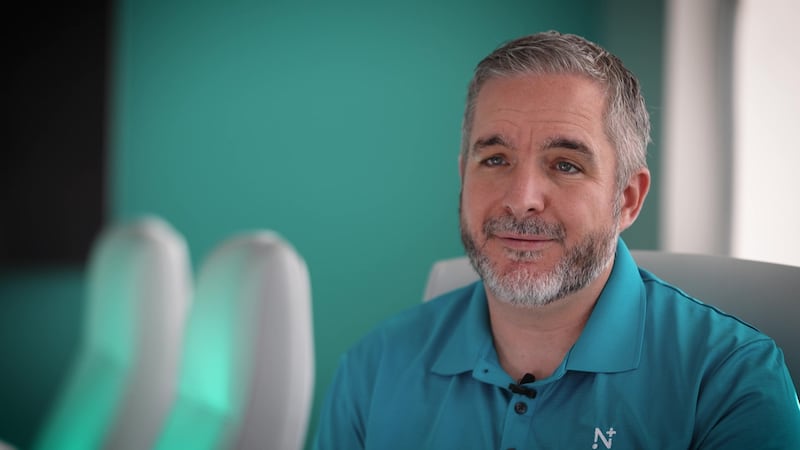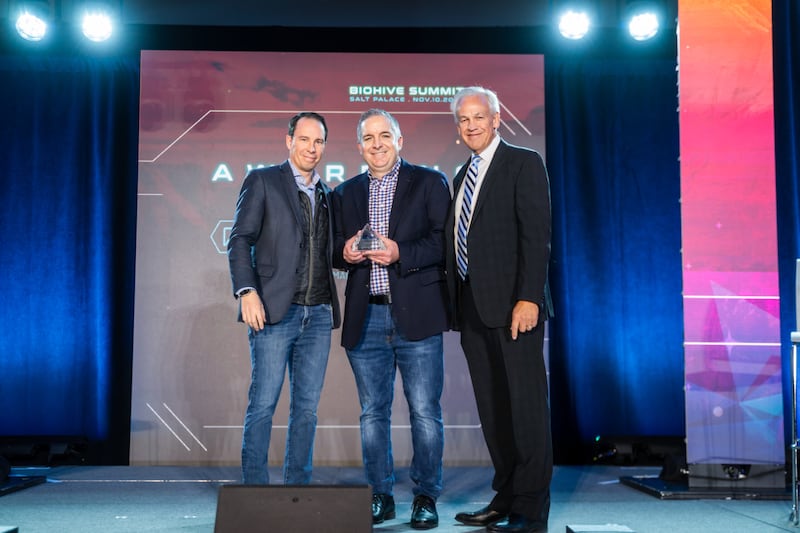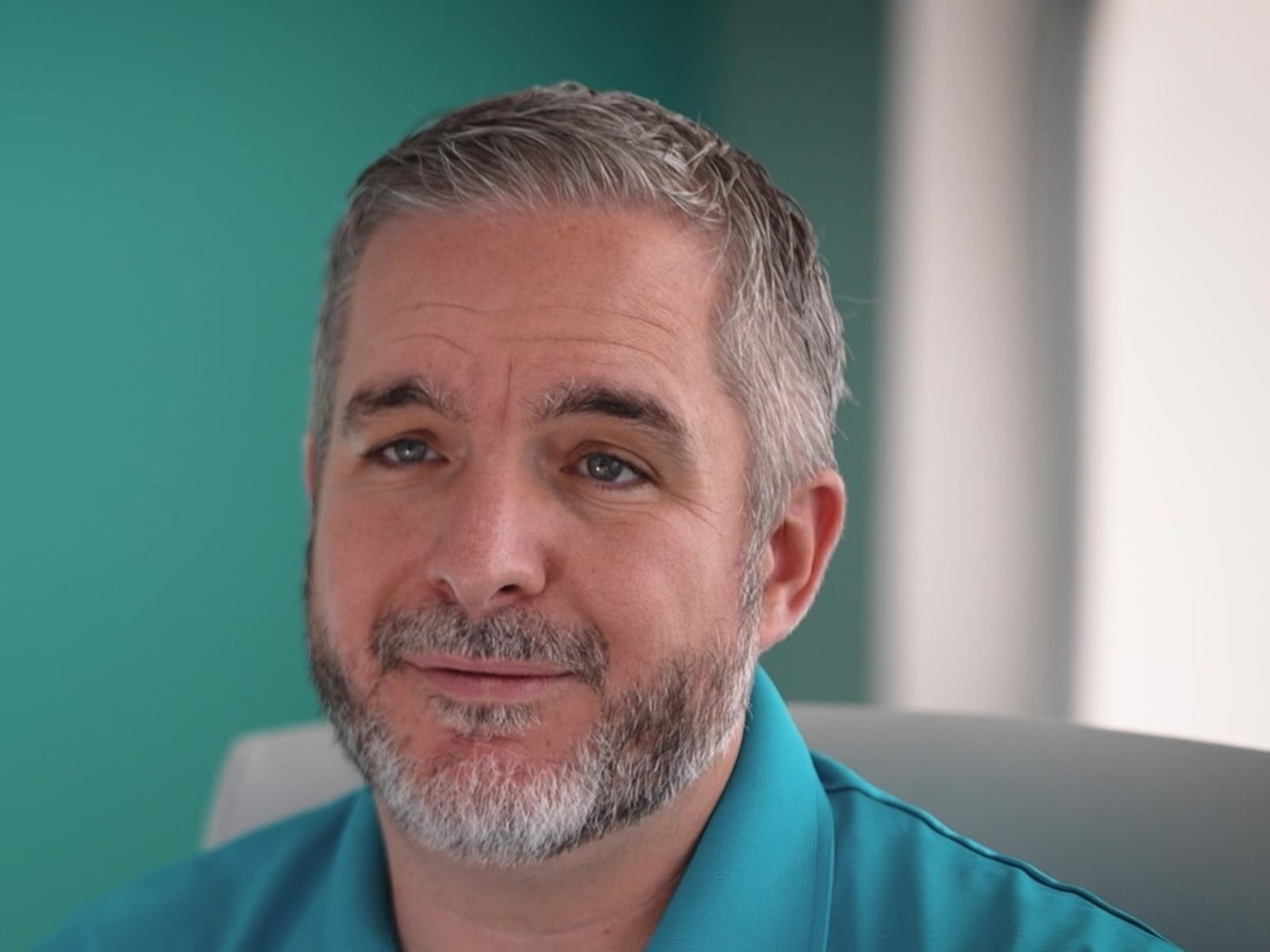
The common thread in my career has been to work hard, figure out insurmountable problems, and fight like hell to break established systems in order to create access for people typically left behind. Fortunately, we’ve been successful in hiring while building HireVue, and now for the last five years have been focused on healthcare with Nomi Health along with dozens of investments in other Utah companies trying to change the lives of the customers they are honored to serve.
I went to Westminster College in Salt Lake City, Utah and started my first company, HireVue, at age 20 while I was there. My co-founder at HireVue, Ryan Money, and I had to get internships to graduate. We convinced our professor that the ultimate internship would be starting a company—I’d sign off on his internship, and he’d sign off on mine.
It was 2004, the economy was terrible, and thankfully our professor let us run with the idea. He said, “Go for it.” We wanted to enter the Utah Entrepreneur Challenge and see if we could place, and we did—we won $1,000. We were bent on building HireVue, and the rest is history.
Back in 2004, hiring looked a lot different than it does today. HireVue introduced the concept of recorded job interviews with webcams where the job applicant would do the recorded interview on their own time, and their interview would be reviewed by the employer’s team later—imagine all of an employer’s interviews being asynchronous. This was back when TiVo was huge, so it was a big inspiration behind HireVue: record live job interviews like TiVo and watch them later at your convenience.
The second motivation for HireVue was the fact that Goldman Sachs had a huge presence in Utah, but they didn’t put any effort into hiring from Westminster with career fairs or sending recruiters to the campus. Basically, our college wasn’t on the “approved” list, so we didn’t have a shot. At HireVue, we believed people were more than their resumes, degrees from special schools, or GPAs—they were stories, ideas, and experiences. We thought any Westminster graduate could do just as well as any Ivy League student, which is what Goldman Sachs hired.
Our goal was to use video to make it easier for companies to get to know more people than they would through traditional hiring methods. At that time, the only alternative was to fly applicants in and spend time with them. As a result, companies were selective about who they’d spend time with. At HireVue, we wanted to make it easy to spend time with a lot of people, and as it turned out, when we did that and gave people a shot to answer questions on their own time and in a structured way, companies would hire people they never thought they would otherwise.
In a way, we led the revolution around breaking the degree and Ivy League requirements for a lot of major companies. And we helped give people the shot they wouldn’t have otherwise had—that was a ton of fun and really meaningful.
What is my opinion on college degrees after building HireVue? Unless you’re talking about high-level finance, attorneys, engineering, the sciences, or the medical profession, they’re largely irrelevant. I think a degree is the best indication that somebody demonstrated the ability to finish something, but the irony is, there are a lot of life reasons why they didn’t either. The conclusion I came to at HireVue is that, in many instances, college degrees don’t matter. You could have the best degree in the world, but if you don’t have the right attitude, you aren’t hungry, you don’t want to learn, or you don’t want to work with other people, guess what? That degree is going to be valueless. In other words, a degree is not a requirement for someone to be successful in a job.
About 10 years ago, we did a lot of work at HireVue on what drove actual performance. We’re not talking about hiring medical doctors but up- and down-the-street roles in a company, whether it’s customer service, sales, or project management. What we learned, especially for early career professionals in their 20s, what that the greatest indicator of success came down to a simple question: How old were you when you got your first job, and why?
Imagine you have two job applicants who are 24 years old. One has a wonderful degree and the other doesn’t. You ask the degree person how old they were when they had their first job, and they say, “This is my first job. I wanted to get an advanced degree.”
Then, you ask the other person. They say, “I may not have a fancy degree, but I got my first job at age 12 mowing lawns, and I also did this and that.” The employer says, “Oh, you’re entrepreneurial.” The job applicant says he worked at a dry cleaner and a restaurant serving tables, etc. He’s 24 and he has 12 years of work experience. He knows what it means to manage a schedule and receive a paycheck.
We actually applied that to professional athletes and it was the same thing. There were common attributes around individuals knowing how to work. Do they work well with others? Do they know how to handle conflict? Do they know how to manage a paycheck? Imagine a professional athlete coming out of college and going into the NFL, and the first time they’ve ever received a paycheck is the first week they get paid as a star athlete. If you had your first experience at 14 rather than 24, you’d have 10 years of life experience understanding what that meant.

The best tuition is the ‘school of life’
Sometimes, the best and most expensive tuition is the school of life. As you go through it, it turns out the school of life is far more indicative of future success than a specific education for some degree. I started mowing lawns when I was 12 years old, and my first real job was dishwashing at a wedding event venue when I was 14. Then, I was a tray boy at Café Rio, and the summer before starting HireVue, I was doing animal shows and kids camp at Hogle Zoo.
HireVue was all in my 20s. I spent 13 years building that company and went through every positive and negative experience as a founder dealing with VCs, up and down economies, and scaling quickly. We added over 400 team members across the world serving many major employers in the world—every major bank, airline, and hotel organization—and major retail brands.
HireVue taught me to value the uniqueness of organizations and to understand what’s unique and what’s the same. I was on the front lines seeing how different organizations built teams. It all went back to how team building was much like the old children’s story that a weed is just a plant planted in the wrong place. It’s the same thing for people.
Shortly after I left HireVue, the company was sold to Carlyle in what is the category’s largest sale to date. HireVue is still operating in Utah today and continues to grow.
Founding two more companies after HireVue
There are people who live by the idea that you have just one shot. If you listen to Mark Cuban, he says, “You have one shot, and there will never be anything better than your best year. Your success is your only shot,” because Cuban made all of his money off one thing back in the 90s that nobody used, but Yahoo paid $5 billion for. He’s since diversified. When I left HireVue at age 32, I vowed to spend my next 50 years contributing to society in a meaningful way.
I naturally build companies—that’s what I love to do. I guess I’m totally unemployable. For me, HireVue was about building a new system to expand access to careers, which are critical to livelihoods. I set out to do the same with healthcare. I have always had an interest in healthcare, and in 2016, I co-founded Videra Health, located in Orem, Utah, with my CTO from HireVue, Loren Larsen. Loren is CEO of Videra, which is everything we knew from HireVue around video, machine learning, AI, and structured interviews, but this time as all that applies to high-risk patients.
At Videra, we deal with drug and alcohol treatment, high-risk medications, etc. Patients can do video sessions and check-ins, and the software picks up changes in personality and suicidal ideation to help save lives. I was initially intrigued by the healthcare world thanks to my experience at Videra. Then, one day, I was in the hospital when my son was born. A woman came into our room from the hospital’s finance team and said, “I’m here to talk to you about your bill before you leave.”
I said, “How much is the bill?” and she said, “It’s $4,500.” I did what I was supposed to do: I saved up our money in our health spending (HSA) account. When I pulled out my HSA card and gave it to her, she said, “What do you want me to do with this?” My response was, “Pay the bill,” and she said, “You have to put at least 10 percent down.” When I asked, “What if I pay the whole thing?” Her reply was, “I’ll take 30 percent off right now.”
I learned firsthand then and there that the price of medical care is wildly arbitrary. The real price of my son’s delivery was $3,000, not $4,500, and the only reason why I got the $3,000 price is that I had the money. That upset me. What about the people who need the lower price? Everyone thinks healthcare problems are unique to healthcare, but they’re not—80 percent of the time, they’re business problems, process problems, technology, or money problems.
For people who deal with serious health issues, cancers, or major accidents, there’s the event. Then there’s cleaning up afterward—the bills, figuring out how to survive, and how to get the meds. That’s not clinical, that’s the business, and to solve that money problem takes two things: One, a whole new infrastructure to connect to the provider directly—to get that $3,000 price they’re willing to give any time—and two, the ability to bring that savings back to the employers that have the money and would gladly pay that on behalf of employees.
Remember in the movie “The Matrix” when they have the red pill and the blue pill? You can take the blue pill and decide to pay the bill and move on, or you can take the red pill and jump into the matrix of US healthcare and decide to do something about it. That’s what I did, and so I started Nomi Health in 2019.

Building the largest direct healthcare provider in the nation
What we’re building Nomi Health to be is the largest direct healthcare provider in America in order to drive down costs and increase access. By “direct healthcare,” we mean the entire modern infrastructure needed to run healthcare more simply, seamlessly, and less costly—from the technology and analytics to care models that bring needed services directly into communities. We deliver everything you need for the healthcare population you’re responsible for, whether you’re an employer, county, or state but do it at up to 50 percent lower cost than how it works in the current system.
As a direct healthcare company, we are rebuilding how healthcare operates in order to have US healthcare run at half the cost. With healthcare costs growing above $4 trillion—larger than massive industries we think of every day like energy, oil and gas, automotive, and airlines—we can no longer afford to turn a blind eye to spiraling care costs, not as buyers of care, but as providers or as patients. Just as we did with Covid in building a new care model that served 14 million Americans, we are rebuilding core processes to solve real issues in how care is paid for and delivered.
That’s impactful because we have a four-and-a-half-trillion-dollar healthcare problem in America every single year. Nomi Health would save the US over $1 trillion a year, and we can all agree there are better things to do than waste that on healthcare. Imagine a world where instead of wasting a trillion dollars on healthcare, we pay teachers 20 percent more. That’s what we work every day to enable at Nomi Health.
Through a fintech platform, we pay providers directly. Through our care-delivery organization, we serve thousands of people a day. Through our analytics platform, we optimize billions of dollars of healthcare spending. We provide an open network of all so our users can go get the care they need at the right doctors anywhere. We’re taking focused business solutions and applying them to focused healthcare problems in order to help solve the healthcare crisis—making it less costly and easier to access.
Who are our customers? Nomi Health serves almost 2,000+ employers, states, and counties nationwide who are fighting every day to do something about their healthcare costs and improve access for the people who need it most.
My thoughts on serial entrepreneurship
When you go into your second company, you can’t help but think of all the things you’re going to do differently, when in reality, if you built a successful company before, you did a lot of things right. You don’t have to change everything. You have to learn, grow and evolve, a lot like we do when we get married or find a life partner. You go into the game headfirst, embrace the good, identify your weaknesses, and solve them so you don’t repeat your mistakes.
Next, dealing with adversity is more important than however much capital you raise. Anything can go wrong, and trust me, it will. Hope you have a great team, a backbone, and the willingness to keep going because that’ll be what gets you through the obstacles.
The last thought—and this took me some time—is that we all read the articles and think everyone is more awesome than us, right? We look at these companies who have crushed it, and they’ve done everything right, or so it seems. We can all think of the companies in Utah that we put up on pedestals, but think of what’s happening right now with FTX—the crypto company everyone was putting on a platform. Turns out, it seemingly cratered and disappeared one day.
What we need to do is stop counting other people’s money and stop looking up to other people’s fame because underneath, they’re just like you and me. Everything goes wrong for them at any given moment in every situation, but we don’t necessarily see it. There’s nothing special about these other companies; anyone can do it. You just have to have faith in yourself and your team and the perseverance to see it through.

